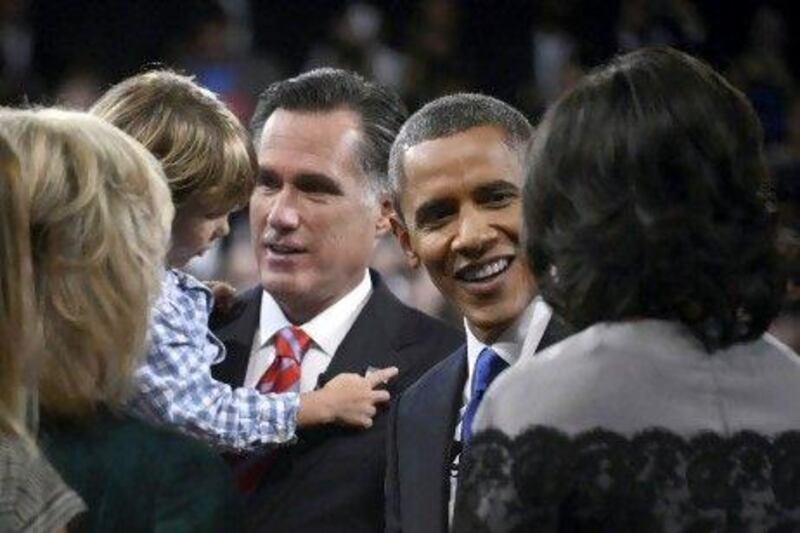WASHINGTON // Iran is the bogeyman, while Syria's leadership must fall. China is a potential partner and Israel's importance to the United States cannot be overstated.
Barack Obama, the incumbent US president, and Mitt Romney, his Republican challenger, found a lot to agree on when they went head-to-head on foreign policy in their third and final presidential debate in Florida on Monday night.
With just a matter of weeks to go before the election, Mr Romney may have agreed with his rival too much.
On an evening where Mr Romney seemed more focused on persuading undecided voters that he would not return to the policies of the previous Republican administration under George W Bush, he also presented very little by way of alternatives.
It was the most notable aspect of a tangle that otherwise held little surprise, said Marina Ottaway, a Middle East expert with the Carnegie Endowment for International Peace, a Washington think tank.
"The most striking thing is how much Romney is moving to the centre after attacking Obama fairly savagely on his foreign policy and accusing him of undermining US influence in the world," Ms Ottaway said. "In the end, he seemed to agree with almost everything Obama had done."
Such a lurch to the centre makes good electoral sense. Polls show a dead heat that may come down to a few undecided voters in swing states such as Ohio. The priority for Mr Romney, therefore, was to present himself as someone who could be trusted with the keys to the world's greatest armoury.
He accomplished that, said Jeffrey Weiss, a Washington Republican strategist and veteran of several presidential campaigns.
"He didn't need to throw any red meat to his conservative base," said Mr Weiss. "What he needed to do was present himself as a safe candidate on the button."
Mr Obama, too, could feel pleased with a performance that saw him easily win the debate, according to several snap polls. CNN had him top his rival by 48 to 40 per cent, while a CBS poll of uncommitted voters saw the US president win by 53 to 23 per cent.
Neither candidate is likely to benefit much in the final counting, however. Foreign policy is not a priority for US voters, among whom unemployment and economic growth are the top concerns. Both candidates duly took every opportunity to turn questions back to domestic issues.
And where the debate was substantive on foreign policy, it was hard to discern much difference between the two.
They both said they would prevent Iran from getting nuclear weapons but that military action should be a last resort, reached only once diplomacy and "crippling" sanctions had been exhausted. They both said China could be a valuable partner on the global stage, but that the country first has to "play by the rules". The discussion on China, in fact, became a discussion about the US car industry in Michigan.
They both relentlessly sought to bolster their pro-Israel credentials, offering the Palestinian-Israeli peace process only the scantest of mentions on a day in which a former US president, Jimmy Carter, was quoted by The New York Times as saying that Benjamin Netanyahu, Israel's prime minster, had abandoned the two-state solution and, by implication, decades-old US policy.
On Syria, meanwhile, neither supported direct US military involvement. Both vowed to bring about the end of the rule of Bashar Al Assad, Syria's president, by strengthening the Syrian opposition without arming extremists among the rebels.
There were disagreements. Mr Romney insisted that the US should spend more on the military, offering Mr Obama the chance to deliver the evening's most memorable line: while it was true that the US Navy had fewer ships than early last century, he said, the military also had "fewer horses and bayonets".
Mr Romney criticised Mr Obama for relying too much on force and not having a comprehensive development strategy to get the Muslim world to "reject extremism on its own".
"We can't kill our way out of this mess," he said, unexpectedly assuming the mantle of the peace candidate.
Mr Romney was clearly keen to come across as the opposite of the foreign policy hawk that the make-up of his group of foreign policy advisers - of whom 17 of 24 are Bush-era neoconservatives - might suggest. And the policies he advocated on Monday night were not the "wrong and reckless" policies that Mr Obama at one point accused him of holding. But they were also not very different from current US policy, a point Mr Obama also happily made.
"What you just heard Governor Romney say is that he doesn't have different ideas," Mr Obama said, during a segment devoted to Syria.
In the context of the election, however, that might not matter, said Ms Ottaway. "Romney succeeded to avoid taking foreign-policy positions that might have scared the electorate. Obama won the debate. But this was not decisive one way or another."






